- Home
- Simon Winchester
The Professor and the Madman: A Tale of Murder, Insanity
The Professor and the Madman: A Tale of Murder, Insanity Read online
The Professor And The Madman
A Tale of Murder, Insanity, and the Making of the Oxford English Dictionary
Simon Winchester
PREFACE
Mysterious a. [f. L. mystērium MYSTERY1 + OUS. Cf. F. mystérieux.]
1. Full of or fraught with mystery; wrapt in mystery; hidden from human knowledge or understanding; impossible or difficult to explain, solve, or discover; of obscure origin, nature, or purpose.
Popular myth has it that one of the most remarkable conversations in modern literary history took place on a cool and misty late autumn afternoon in 1896, in the small village of Crowthorne in the county of Berkshire.
One of the parties to the colloquy was the formidable Dr. James Murray, the editor of the Oxford English Dictionary. On the day in question he had traveled fifty miles by train from Oxford to meet an enigmatic figure named Dr. W. C. Minor, who was among the most prolific of the thousands of volunteer contributors whose labors lay at the core of the dictionary’s creation.
For very nearly twenty years beforehand these two men had corresponded regularly about the finer points of English lexicography, but they had never met. Dr. Minor seemed never willing or able to leave his home at Crowthorne, never willing to come to Oxford. He was unable to offer any kind of explanation, or to do more than offer his regrets.
Dr. Murray, who himself was rarely free from the burdens of his work at his dictionary headquarters, the famous Scriptorium in Oxford, had nonetheless long dearly wished to see and thank his mysterious and intriguing helper. And particularly so by the late 1890s, with the dictionary well on its way to being half completed: Official honors were being showered upon all its creators, and Murray wanted to make sure that all those involved—even men so apparently bashful as Dr. Minor—were recognized for the valuable work they had done. He decided he would pay a visit.
Once he had made up his mind to go, he telegraphed his intentions, adding that he would find it most convenient to take a train that arrived at Crowthorne Station—then actually known as Wellington College Station, since it served the famous boys’ school situated in the village—just after two on a certain Wednesday in November. Dr. Minor sent a wire by return to say that he was indeed expected and would be made most welcome. On the journey from Oxford the weather was fine; the trains were on time; the auguries, in short, were good.
At the railway station a polished landau and a liveried coachman were waiting, and with James Murray aboard they clip-clopped back through the lanes of rural Berkshire. After twenty minutes or so the carriage turned up a long drive lined with tall poplars, drawing up eventually outside a huge and rather forbidding red-brick mansion. A solemn servant showed the lexicographer upstairs, and into a book-lined study, where behind an immense mahogany desk stood a man of undoubted importance. Dr. Murray bowed gravely, and launched into the brief speech of greeting that he had so long rehearsed:
“A very good afternoon to you, sir. I am Dr. James Murray of the London Philological Society, and Editor of the Oxford English Dictionary. It is indeed an honour and a pleasure to at long last make your acquaintance—for you must be, kind sir, my most assiduous helpmeet, Dr. W. C. Minor?”
There was a brief pause, a momentary air of mutual embarrassment. A clock ticked loudly. There were muffled footsteps in the hall. A distant clank of keys. And then the man behind the desk cleared his throat, and he spoke:
“I regret, kind sir, that I am not. It is not at all as you suppose. I am in fact the Governor of the Broadmoor Criminal Lunatic Asylum. Dr. Minor is most certainly here. But he is an inmate. He has been a patient here for more than twenty years. He is our longest-staying resident.”
Although the official government files relating to this case are secret, and have been locked away for more than a century, I have recently been allowed to see them. What follows is the strange, tragic, yet spiritually uplifting story they reveal.
1
THE DEAD OF NIGHT
IN LAMBETH MARSH
Murder (), sb. Forms: a. I morþor, -ur, 3–4 morþre, 3–4, 6 murthre, 4 myrþer, 4–6 murthir, morther, 5 Sc. murthour, murthyr, 5–6 murthur, 6 mwrther, Sc. morthour, 4–9 (now dial. and Hist. or arch.) murther; β. 3–5 murdre, 4–5 moerdre, 4–6 mordre, 5 moordre, 6 murdur, mourdre, 6– murder. [OE. morþor neut. (with pl. of masc. form morþras) = Goth. maurþr neut.:-OTeut. *murþrom:-pre-Teut. *mrtro-m, f. root *mer-: mor-: mr- to die, whence L. morī to die, mors (morti-) death, Gr. , mortal, Skr. to die, mará masc., mrti fem., death, márta mortal, OSl. mĭěti, Lith. mirti to die, Welsh marw, Irish marþ dead.
The word has not been found in any Teut. lang. but Eng. and Gothic, but that it existed in continental WGer. is evident, as it is the source of OF. murdre, murtre (mod. F. meurtre) and of med. L. mordrum, murdrum, and OHG. had the derivative murdren MURDER v. All the Teut. langs. exc. Gothic possessed a synonymous word from the same root with different suffix: OE. mor neut., masc. (MURTH1), OS. mor neut., OFris. morth, mord neut., MDu. mort, mord neut. (Du. moord), OHG. mord (MHG. mort, mod. G. mord), ON. mor neut.:-OTeut. *murþo-:-pre-Teut. *mrto-.
The change of original into d (contrary to the general tendency to change d into before syllabic r) was prob. due to the influence of the AF. murdre, moerdre and the Law Latin murdrum.]
1. The most heinous kind of criminal homicide; also, an instance of this. In English (also Sc. and U.S.) Law, defined as the unlawful killing of a human being with malice aforethought; often more explicitly wilful murder.
In OE. the word could be applied to any homicide that was strongly reprobated (it had also the senses ‘great wickedness’, ‘deadly injury’, ‘torment’). More strictly, however, it denoted secret murder, which in Germanic antiquity was alone regarded as (in the modern sense) a crime, open homicide being considered a private wrong calling for blood-revenge or compensation. Even under Edward I, Britton explains the AF. murdre only as felonious homicide of which both the perpetrator and the victim are unidentified. The ‘malice aforethought’ which enters into the legal definition of murder, does not (as now interpreted) admit of any summary definition. A person may even be guilty of ‘wilful murder’ without intending the death of the victim, as when death results from an unlawful act which the doer knew to be likely to cause the death of some one, or from injuries inflicted to facilitate the commission of certain offences. It is essential to ‘murder’ that the perpetrator be of sound mind, and (in England, though not in Scotland) that death should ensue within a year and a day after the act presumed to have caused it. In British law no degrees of guilt are recognized in murder; in the U.S. the law distinguishes ‘murder in the first degree’ (where there are no mitigating circumstances) and ‘murder in the second degree’.
In Victorian London, even in a place as louche and notoriously crime-ridden as Lambeth Marsh, the sound of gunshots was a rare event indeed. The marsh was a sinister place, a jumble of slums and sin that crouched, dark and ogrelike, on the bank of the Thames just across from Westminster; few respectable Londoners would ever admit to venturing there. It was a robustly violent part of town as well—the footpad lurked in Lambeth, there had once been an outbreak of garroting, and in every crowded alley were the roughest kinds of pickpocket. Fagin, Bill Sikes, and Oliver Twist would have all seemed quite at home in Victorian Lambeth: This was Dickensian London writ large.
But it was not a place for men with guns. The armed criminal was a phenomenon little known in the Lambeth of Prime Minister Gladstone’s day, and even less known in the entire metropolitan vastness of London. Guns were costly, cumbersome, difficult to use, hard to conceal. Then, as still today, the u
se of a firearm in the commission of a crime was thought of as somehow a very un-British act—and as something to be written about and recorded as a rarity. “Happily,” proclaimed a smug editorial in Lambeth’s weekly newspaper, “we in this country have no experience of the crime of ‘shooting down,’ so common in the United States.”
So when a brief fusillade of three revolver shots rang out shortly after two o’clock on the moonlit Saturday morning of February 17, 1872, the sound was unimagined, unprecedented, and shocking. The three cracks—perhaps there were four—were loud, very loud, and they echoed through the cold and smokily damp night air. They were heard—and, considering their rarity, just by chance instantly recognized—by a keen young police constable named Henry Tarrant, then attached to the Southwark Constabulary’s L Division.
The clocks had only recently struck two, his notes said later; he was performing with routine languor the duties of the graveyard shift, walking slowly beneath the viaduct arches beside Waterloo Railway Station, rattling the locks of the shops and cursing the bone-numbing chill.
When he heard the shots, Tarrant blew his whistle to alert any colleagues who (he hoped) might be on patrol nearby, and he began to run. Within seconds he had raced through the warren of mean and slippery lanes that made up what in those days was still called a village, and had emerged into the wide riverside swath of Belvedere Road, from whence he was certain the sounds had come.
Another policeman, Henry Burton, who had heard the piercing whistle, as had a third, William Ward, rushed to the scene. According to Burton’s notes, he dashed toward the echoing sound and came across his colleague Tarrant, who was by then holding a man, as if arresting him. “Quick!” cried Tarrant. “Go to the road—a man has been shot!” Burton and Ward raced toward Belvedere Road and within seconds found the unmoving body of a dying man. They fell to their knees, and onlookers noted they had cast off their helmets and gloves and were hunched over the victim.
There was blood gushing onto the pavement—blood staining a spot that would for many months afterward be described in London’s more dramatically minded papers as the location of A HEINOUS CRIME, A TERRIBLE EVENT, AN ATROCIOUS OCCURRENCE, A VILE MURDER.
The Lambeth Tragedy, the papers eventually settled upon calling it—as if the simple existence of Lambeth itself were not something of a tragedy. Yet this was a most unusual event, even by the diminished standards of the marsh dwellers. For though the place where the killing occurred had over the years been witness to many strange events, the kind eagerly chronicled in the penny dreadfuls, this particular drama was to trigger a chain of consequences that was quite without precedent. And while some aspects of this crime and its aftermath would turn out to be sad and barely believable, not all of them, as this account will show, were to be wholly tragic. Far from it, indeed.
Even today Lambeth is a singularly unlovely part of the British capital, jammed anonymously between the great fan of roads and railway lines that take commuters in and out of the city center from the southern counties. These days the Royal Festival Hall and the South Bank Centre stand there, built on the site of the 1951 fairgrounds where an entertainment was staged to help cheer up the rationed and threadbare Londoners. Otherwise it is an unlovely, characterless sort of place—rows of prisonlike buildings that house lesser government ministries, the headquarters of an oil company around which winter winds whip bitterly, a few unmemorable pubs and newspaper shops, and the lowering presence of Waterloo Station—lately expanded with the terminal for the Channel Tunnel express trains—which exerts its dull magnetic pull over the neighborhood.
The railway chiefs of old never bothered to build a grand station hotel at Waterloo—though they did build monster structures of great luxury at the other London stations, like Victoria and Paddington, and even St. Pancras and King’s Cross. Lambeth has long been one of the nastier parts of London; until very recently, with the further development of the Festival Hall site, no one of any style and consequence has ever wanted to linger there, neither a passenger back in the days of the Victorian boat trains, nor anyone for any reason at all today. It is slowly improving; but its reputation dogs it.
A hundred years ago it was positively vile. It was still then low, marshy, and undrained, a swampy gyre of pathways where a sad little stream called the Neckinger seeped into the Thames. The land was jointly owned by the archbishop of Canterbury and the duke of Cornwall, landlords who, rich enough in their own right, never bothered to develop it in the manner of the great lords of London—Grosvenor, Bedford, Devonshire—who created the squares, mansions, and terraces on the far side of the river.
So it was instead a place of warehouses, tenant shacks, and miserable rows of ill-built houses. There were blacking factories (shoe polish makers, like the one in which the young Charles Dickens worked) and soap boilers, small firms of dyers and lime burners, and tanning yards where the leatherworkers used a substance for darkening skins that was known as “pure” and that was gathered from the streets each night by the filthiest of the local indigents—“pure” being a Victorian term for dog turds.
A sickly smell of yeast and hops lay over the town, wafting from the chimneys of the great Red Lion Brewery, which stood on Belvedere Road, just north of the Hungerford Bridge. And this bridge was symbolic of what encompassed the entire marsh—the railways, hefted high over the swamps, on viaducts on which the trains (including those of the London Necropolis Railway, built to take corpses to the cemeteries in the suburb of Woking) chuffed and snorted, and across which miles of wagons lurched and banged. Lambeth was widely regarded as one of the noisiest and most sulfurous parts of a capital that had already a grim reputation for din and dirt.
Lambeth Marsh was also, as it happened, just beyond the legal jurisdiction of both the Cities of London and Westminster. It belonged administratively—at least until 1888—to the County of Surrey—meaning that the relatively strict laws that applied to the capital’s citizens did not apply to anyone who ventured, via one of the new bridges, like Waterloo, Blackfriars, Westminster, or Hungerford, into the wen of Lambeth. The village thus fast became known as a site of revelry and abandon—a place where public houses, brothels, and lewd theaters abounded, and where a man could find entertainment of all kinds—and disease of all varieties—for no more than a handful of pennies.
To see a play that would not pass muster with the London censors, to be able to drink absinthe into the small hours of the morning, to buy the choicest pornography newly smuggled from Paris, or to have a girl of any age and not be concerned that a Bow Street runner (as London’s early police were known), or her parents, might chase after you—you “went Surreyside,” as they said, to Lambeth.
But, as with most slums, its cheapness attracted respectable men to live and work in Lambeth too, and by all accounts George Merrett was one of them. He was a stoker at the Red Lion Brewery; he had been there for the previous eight years, employed all the time as one of the gang who kept the fires burning through the day and night, keeping the vats bubbling and the barley malting. He was thirty-four years old and he lived locally, at 24 Cornwall Cottages, on the Cornwall Road.
George Merrett was, like so many younger workers in Victorian London, an immigrant from the countryside, and so was his wife, Eliza. He came from a village in Wiltshire, she from Gloucestershire. They had both been farm laborers and—with no protection by unions, no solidarity with their fellows—had been paid trifling sums to perform humiliating tasks for pitiless masters. They had met at a farm show in the Cotswolds and had vowed to leave together for the immeasurable possibilities offered by London, only two hours away on the new express train from Swindon. They moved first to north London, where their first daughter, Clare, was born in 1860; then they shifted into the city center; and finally in 1867, the family having become too large and costly and manual work too scarce, they found themselves near the brewery site in the bustling sty of Lambeth.
The young couple’s surroundings and lodgings were exactly as the illustrator
Gustave Doré had drawn on one of his horrified expeditions from Paris: a dim world of bricks and soot and screeching iron, of huddled tenements, of tiny backyards, each with a privy and clothes boiler and washing line, and everywhere an air of damp and sulfurous stench, and even a rough-hewn, rollicking, hugger-mugger, devil-may-care, peculiarly London type of good cheer. Whether the Merretts missed the fields and the cider and the skylarks, or whether they imagined that that ideal had ever truly been the world they had left, we shall never know.
By the winter of 1871 George and Eliza had, as was typical of the inhabitants of the dingier quarters of Victorian London, a very substantial family: six children, ranging from Clare at nearly thirteen to Freddy at twelve months. Mrs. Merrett was about to be confined with her seventh pregnancy. They were a poor family, as were most in Lambeth: George Merrett brought home twenty-four shillings a week, a miserable sum even then. With rent payable to the archbishop, and with food needed for the eight ever-open mouths, theirs were straitened circumstances indeed.
On the Saturday morning, just before 2 A.M., Merrett was awakened by a neighbor tapping on his window, as prearranged. He rose from bed, and readied himself for the dawn shift. It was a bitter morning, and he dressed as warmly as he could afford: a threadbare greatcoat over the kind of smock-jacket that Victorians called a slop, a tattered gray shirt, corduroy trousers tied at the ankle with twine, heavy socks, and black boots. The clothes were none too clean, but he was to heave coal for the next eight hours, and could not be too bothered with appearance.

 The Surgeon of Crowthorne
The Surgeon of Crowthorne Korea: A Walk Through the Land of Miracles
Korea: A Walk Through the Land of Miracles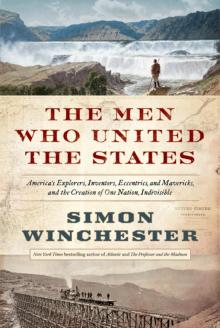 The Men Who United the States: America's Explorers
The Men Who United the States: America's Explorers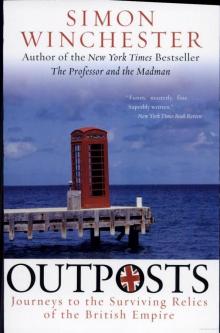 Outposts: Journeys to the Surviving Relics of the British Empire
Outposts: Journeys to the Surviving Relics of the British Empire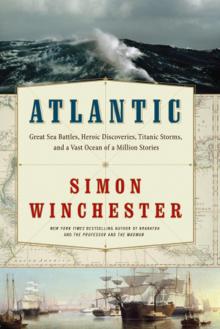 Atlantic: Great Sea Battles, Heroic Discoveries, Titanic Storms
Atlantic: Great Sea Battles, Heroic Discoveries, Titanic Storms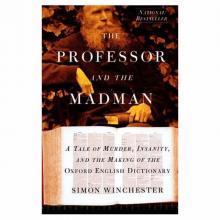 The Professor and the Madman: A Tale of Murder, Insanity
The Professor and the Madman: A Tale of Murder, Insanity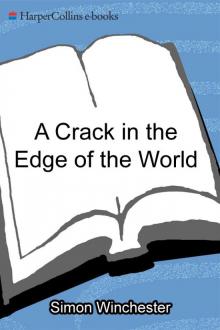 A Crack in the Edge of the World
A Crack in the Edge of the World The Perfectionists: How Precision Engineers Created the Modern World
The Perfectionists: How Precision Engineers Created the Modern World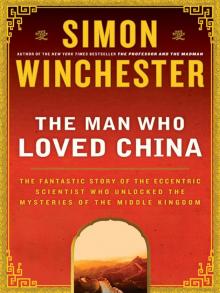 The Man Who Loved China: The Fantastic Story of the Eccentric Scientist
The Man Who Loved China: The Fantastic Story of the Eccentric Scientist The River at the Center of the World: A Journey Up the Yangtze
The River at the Center of the World: A Journey Up the Yangtze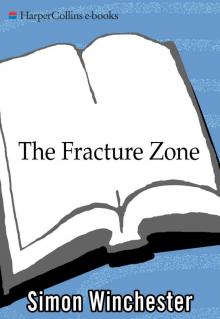 The Fracture Zone: My Return to the Balkans
The Fracture Zone: My Return to the Balkans The Map That Changed the World
The Map That Changed the World Krakatoa: The Day the World Exploded
Krakatoa: The Day the World Exploded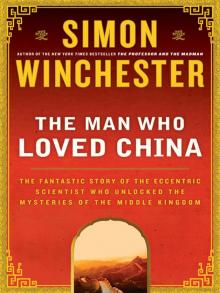 The Man Who Loved China
The Man Who Loved China The River at the Centre of the World
The River at the Centre of the World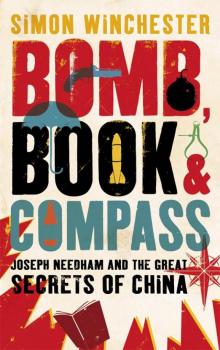 Bomb, Book and Compass
Bomb, Book and Compass The Perfectionists
The Perfectionists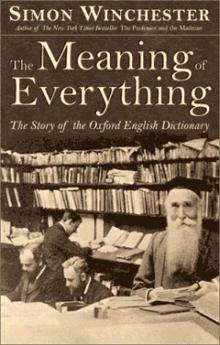 The Meaning of Everything
The Meaning of Everything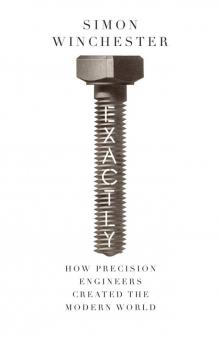 Exactly
Exactly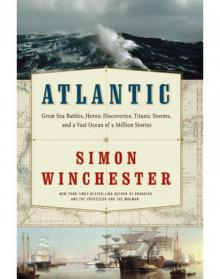 Atlantic
Atlantic Korea
Korea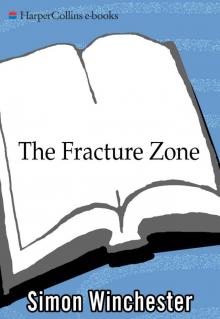 The Fracture Zone
The Fracture Zone Pacific
Pacific Krakatoa
Krakatoa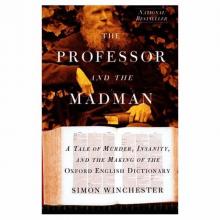 The Professor and the Madman
The Professor and the Madman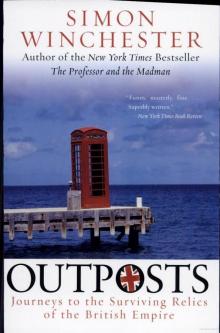 Outposts
Outposts